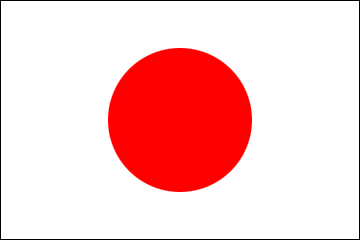Previous Political Relations News
- Prime Minister Abe's Visit to New Zealand , Australia and Papua New Guinea (July 6 - 12, 2014)
- Visit to New Zealand by Foreign Minister Kishida (June 9, 2013)
- Parliamentary Vice-Minister for Foreign Affairs Joe Nakano's visit to New Zealand (May 30, 2012)
- Exchange of Congratulatory Messages by Prime Ministers to Commemorate the 60th Anniversary of Japan-New Zealand Diplomatic Relations (April 28, 2012)
- Phone Conversation between PM Kan and PM Key (14 March 2011)
- Phone Conversation between Foreign Minister Matsumoto and Foreign Minister McCully (13 March 2011)
- Phone Conversation between Foreign Minister Maehara and Foreign Minister McCully on Canterbury Earthquake (7 March 2011)
- Phone Conversation between PM Kan and PM Key (24 February 2011)
- Foreign Minister Okada meets Hon Tim Groser (4 February 2010)
- Visit to Japan of Hon. John Key, Prime Minister of New Zealand (29 October 2009)
- Foreign Minister Nakasone visits New Zealand (29-30 April 2009)
- PM Helen Clark's Visit to Japan in 2008
- PM Junichiro Koizumi and PM Helen Clark met in Tokyo (2 June, 2005)
- Prime Minister Junichiro Koizumi's Visit to New Zealand in 2002
- Visit to Japan of Prime Minister Helen Clark of New Zealand (20 April 2001)
Exchange of Congratulatory Messages by Prime Ministers to Commemorate the 60th Anniversary of Japan-New Zealand Diplomatic Relations
On 28 April 2012, Japan and New Zealand celebrated the 60th anniversary of their diplomatic relations, which was established as a result of entering into effect of the San Francisco Peace Treaty on the same day, 1952. The Prime Ministers of the two countries have recently exchanged the congratulatory messages to commemorate this. The message of Prime Minister Yoshihiko Noda was handed to Ambassador Ian Kennedy of New Zealand by the Japanese Foreign Minister, Koichiro Gemba in Tokyo and, in Wellington, Prime Minister John Key's message was handed to Ambassador Hideto Mitamura of Japan by the New Zealand Foreign Minister, Murray McCully, respectively.
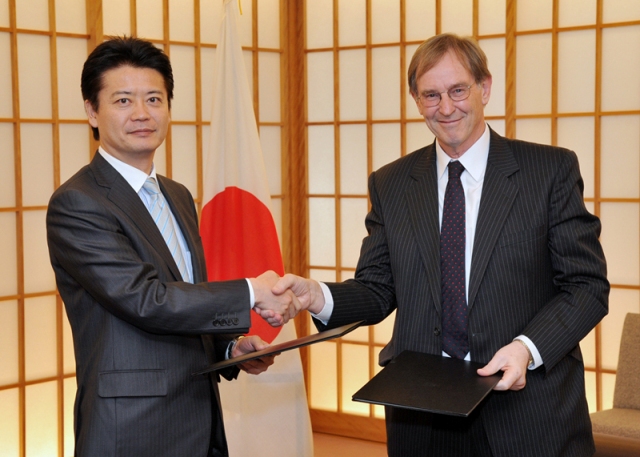
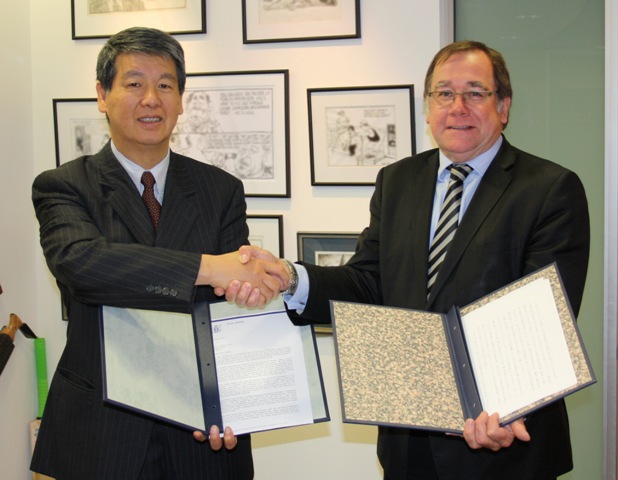
A Congratulatory Message from H.E. Mr Yoshihiko Noda, Prime Minister of Japan (English translation)
28 April 2012
Dear Prime Minister,
Japan - New Zealand relationship marks the sixtieth anniversary of the establishment of diplomatic relations this year. Together, we would like to celebrate this historic occasion.
Our bilateral diplomatic relationship commenced sixty years ago on 28 April 1952 with the entering into force of the San Francisco Peace Treaty followed by the establishment of the New Zealand legation in Japan as your country's first diplomatic mission in Asia, and then by the establishment of the Japanese legation in New Zealand. Both nations have since cultivated friendly ties, not only through expanding trade and tourism, but also through our multifaceted human and cultural ties forged at various levels and areas such as the increased number of Japanese language learners in New Zealand (currently over thirty thousand) and forty-two sister-city relationships.
New Zealand and Japan are invaluable partners in the Asia-Pacific region which share fundamental values such as democracy, and we have strengthened our cooperative relationship through regional frameworks including APEC and the EAS. Furthermore, the two countries are contributing together to the peace and prosperity of the international community by addressing global issues such as development assistance, environmental issues. Our cooperation in Afghanistan and the Pacific islands are among those recent examples. In this manner our two countries have built up a deep and broad relationship.
Last year both countries went through the tragic hardship of devastating earthquakes just eighteen days apart. Japan's urban rescue team arrived in New Zealand swiftly after the Canterbury Earthquake and made their utmost efforts to search and rescue those affected. Following the Great East Japan Earthquake your rescue team immediately made their way to Japan and provided assistance in Minamisanriku town in Miyagi prefecture, which was one of the most severely affected areas. The mutual support extended to each country after the two earthquakes clearly demonstrated our strong bonds fostered at all levels since the establishment of our diplomatic relationship.
The commemorative logo to mark the sixtieth anniversary represents silver fern, which symbolizes unwavering spirit in New Zealand, and origami crane, which symbolizes peace and longevity in Japan. The two counties celebrate this special day in our history as we are both striving to recover from the earthquakes.
Although New Zealand and Japan are geographically distant over the Pacific, I am always pleasantly surprised to find the numerous common characteristics between us. We are both island countries extending North and South, thereby presenting similar features rich with greenery. Both peoples are modest and diligent. We are also fond of wooden architecture and hot springs. Every time I notice more things in common I feel strong affinity with your country.
The cooperative and friendly ties which have happily existed between New Zealand and Japan were not achieved overnight. Now reflecting upon the strong bonds of friendship that have been fostered over the last sixty years, I wholeheartedly hope that New Zealand and Japan will continue to move forward hand in hand, both enjoying peace and prosperity and continuing to flourish into the future.
Yours sincerely,
Yoshihiko Noda
Prime Minister of Japan
A Congratulatory Message from The Rt Hon John Key, Prime Minister of New Zealand
28 April 2012
H.E. Yoshihiko Noda
Prime Minister
JAPAN
Dear Prime Minister,
I write with pleasure to commemorate the 60th anniversary of diplomatic relations between our two nations. On this day in 1952, with the entry into force of the San Francisco Peace Treaty, diplomatic relations were established between New Zealand and Japan. New Zealand established a diplomatic mission in Tokyo, which was our first official diplomatic presence in Asia, and Japan opened its mission in New Zealand the following year.
Our bilateral relationship has flourished over the following six decades. Japan is one of New Zealand's most important and enduring diplomatic relationships. We have strong political ties, nourished by frequent exchanges at Prime Ministerial and Ministerial level. Our countries share a belief in the dynamism of open and democratic societies, and a desire to achieve peace and stability in the Asia-Pacific region. These shared values have led to our working increasingly closely in the development assistance sphere, including recently in Afghanistan and the Pacific Islands. New Zealand and Japan share a close working relationship in international institutions like the United Nations, APEC and the EAS.
Strong trading linkages with Japan have played a key role in the development of our economies. New Zealanders have long been keen purchasers of Japanese products and technology, while Japan is a major destination for New Zealand's exports. Japan has been a significant investor in New Zealand's economy and a valuable partner for us in tourism and international education. We look forward to strengthening our trade and economic ties with Japan still further through progressive reduction of barriers to trade, and cooperation on regional trade liberalisation initiatives.
As the result of many decades of cultural, educational and business exchanges - including the Japanese Government's excellent JET, JENESYS and Mombukagakusho scholarship initiatives - the New Zealand and Japanese people have built up a deep mutual understanding. New Zealanders are uniquely interested in Japanese language and culture. Japanese is widely taught in New Zealand schools, and there are many grassroots exchange relationships in existence including many sister city relationships and Japan-New Zealand friendship societies.
When New Zealand called for international assistance after the Christchurch earthquake, Japan was one of the first countries to offer immediate help. Japan's support in our time of need will never be forgotten. Similarly, when the Great East Japan Earthquake struck, we were pleased to be in a position to respond. The mutual support provided by our Urban Search and Rescue Teams, as well as the generous donations made in both directions are testimony to the bonds of friendship that our nations have built over the past sixty years.
Both nations are planning events throughout 2012 to commemorate our 60th anniversary of diplomatic relations. These will reflect the breadth of our connections and I look forward to the exciting opportunities that the next 60 years hold for our bilateral relationship. I hope it may be possible for us to mark our 60th anniversary with a commemorative meeting later this year.
Allow me to conclude with a proverb of New Zealand's Māori people to describe the ties between us.
Naku te rourou nau te rourou ka ora ai te iwi
(With your basket and my basket the people will live)
Yours sincerely
Rt Hon John Key
PRIME MINISTER
Foreign Minister Okada meets Hon Tim Groser (4 February 2010)
On 4 February, Mr Katsuya Okada, Minister for Foreign Affairs of Japan, held a meeting with Hon Tim Groser, Minister of Trade and Minister Responsible for International Climate Change Negotiations of New Zealand, during his visit to Japan. The summary of the meeting is as follows.
Mr Okada and Mr Groser reaffirmed that Japan and New Zealand, as important partners in the Asia Pacific region, would continue to work for further strengthening bilateral relations.
Both ministers shared the view on the current situation surrounding the climate change issue and agreed to continue to work closely together towards COP16. In addition, Mr Groser expressed New Zealand's appreciation to Japan's cooperation towards “Global Research Alliance”.
On the whaling issue, Mr Okada said that the Sea Shepherds activity of intentional obstruction threatens maritime safety and that these extremely dangerous acts are unacceptable and that Japan would investigate the recent collision between the Ady Gil and the Shonan Maru II in cooperation with New Zealand. Mr Groser responded that New Zealand is fully committed to finding a diplomatic solution of the whaling issue and that it is against violent protests. Minister Groser also said that New Zealand would cooperate with the investigation of the collision incident.
Minister Groser expressed that he was looking forward to welcoming a visit from Minister Okada to New Zealand in the near future. Minister Okada replied that he would like to visit New Zealand if opportunity allowed.
Japan-New Zealand Foreign Ministers' Meeting (20 May 2009)
His Excellency Mr Hirofumi Nakasone, Minister for Foreign Affairs of Japan held talks with the Honourable Murray McCully, Foreign Minister of New Zealand, who was visiting Japan to attend the Fifth Pacific Islands Leaders Meeting (PALM5) in Tokyo on 20 May 2009.
During the talks, Minister Nakasone expressed his sincere appreciation for the warm welcome extended by the Government of New Zealand during his visit to New Zealand in April 2009, and stated that he would steadily follow up the outcome of the visit. Minister Nakasone and Minister McCully shared the view to continuously cooperate for the strengthening of the bilateral relations. The Ministers also exchanged views on the PALM5, North Korea and the new strain of influenza.
Foreign Minister Nakasone visits New Zealand (29-30 April 2009)
HE Mr Hirofumi Nakasone, Minister for Foreign Affairs of Japan, visited New Zealand on 29 and 30 April 2009. On this occasion, Mr Nakasone had bilateral talks with Hon Murray McCully, Minister of Foreign Affairs of New Zealand, and also called on Hon John Key, Prime Minister of New Zealand.
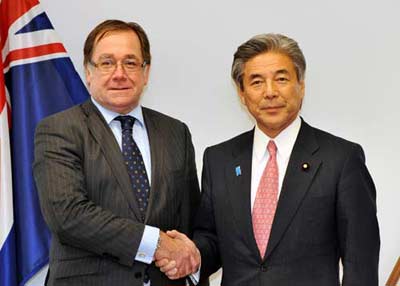
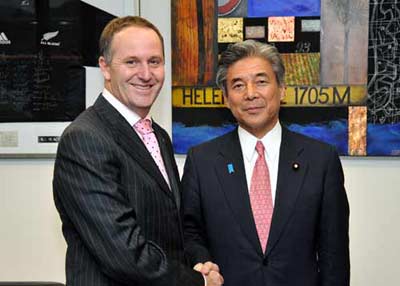
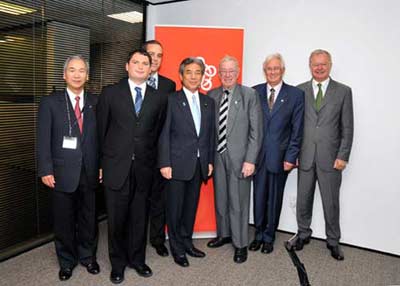
1. Summary of the bilateral talks with and the dinner hosted by Hon Murray McCully on 29 April 2009
- Novel Influenza
In referring to the news that there were suspected cases of Influenza A (H1N1) in New Zealand, Mr Nakasone said that Japan wishes to cooperate and share related information with New Zealand. Hon McCully responded that the New Zealand Government has taken necessary measures against the Influenza.
- Bilateral relations
(i) High Level Exchanges
Mr Nakasone extended an invitation to Japan for Prime Minister Key. Hon McCully welcomed the invitation.
(ii) Trade and Economic Relations
Hon McCully stated that he wishes to launch a new Officials Group on Japan-New Zealand economic relations soon, and Mr Nakasone responded that he hopes that the Officials Group will become a stage for discussing various policy options.
(iii) Science and Technology Cooperation
The two ministers agreed to start negotiating to conclude a science and technical co-operation agreement.
(iv) Human Exchanges
Mr Nakasone introduced a new invitation plan for 50 young New Zealanders to Japan. Hon McCully stated that he hopes to work together to improve the existing working holiday programme between the two countries. - Regional issues
(i) North Korea
With regards to the missile launches by North Korea, Mr Nakasone emphasized the importance of implementing the UN Security Council Resolution 1718. He also stated that Japan will not close a door for the Six Party Talks and hopes North Korea to make a wise decision. Furthermore, he requested New Zealand's cooperation towards the comprehensive resolution of various problems related to North Korea, including abduction, nuclear weapons and missiles. Hon McCully responded that New Zealand has understood and supported Japan's position on North Korea, and that New Zealand promptly issued a statement to condemn the North Korean missile launches. He also added that North Korea's response after the launches was regrettable, but it is important to handle the reaction with patience. Furthermore, Hon McCully said that New Zealand feels strong sympathy with Japan on abduction issues, and has supported Japan.
(ii) Pacific Island Countries
Hon McCully said that he would attend the 5th Pacific Islands Leaders Meeting (PALM5) in Japan in May. - Other topics
(i) Disarmament
After the delivery of Mr Nakasone's speech about nuclear disarmament on 27 April 2009, Hon McCully stated that he agrees with many points in the speech, and in particular he was deeply moved by explicit references to the responsibility of disarmament by nuclear nations and the processes towards nuclear disarmament.
(ii) Whaling
Hon McCully stated that New Zealand wishes to continue to discuss whaling issues with Japan at the International Whaling Commission as well as at the bilateral level.
(iii) Bringing a Rugby World Cup to Japan
Mr Nakasone requested New Zealand's support on bringing the 2015 or 2019 Rugby World Cup to Japan. Hon McCully stated that he would personally support this.
2. Summary of the Call on Hon John Key, Prime Minister of New Zealand by HE Mr Hirofumi Nakasone, Minister for Foreign Affairs of Japan on 29 April 2009
At the beginning, Mr Nakasone conveyed a message from HE Mr Taro Aso, Prime Minister of Japan, that it was regrettable that a bilateral meeting between the two Prime Ministers on the occasion of the East Asia Summit was cancelled. Mr Nakasone also conveyed the invitation to Japan for Hon Key. In response, Hon Key said that he accepts the invitation with pleasure.
- Global Financial Crisis
Hon Key stated that he highly appreciates Japan's measures towards the global financial crisis, in particular the increased lending to the International Monetary Fund and strong economic-stimulus packages. Mr Nakasone responded that Japan will continue to contribute to the tackling of the global economic crisis and will carry out its responsibilities. Hon Key explained Mr Nakasone New Zealand's economic-stimulus packages.
- Novel Influenza
Following Hon Key's statement that he is worried about a decrease in the number of Japanese tourists to New Zealand due to the influence of influenza A (H1N1), and that New Zealand has taken effective measures from an early stage, Mr Nakasone responded by saying he would take note of Hon Key's words.
- North Korea
Hon Key stated that he hopes North Korea to take responsible actions instead of withdrawing from the Six Party Talks.
Prime Minister's Visit to Japan in 2008
Prime Minister Yasuo Fukuda of Japan and Prime Minister Helen Clark of New Zealand met in Tokyo on 14 May, 2008 and discussed a wide range of issues of mutual interest, and they committed to enhance and strengthen further cordial relationship to meet common challenges.
Joint Press Statements by Prime Minister Helen Clark and Prime Minister Yasuo Fukuda
Prime Minister's Visit to Japan in 2005
Prime Minister Junichiro Koizumi of Japan and Prime Minister Helen Clark of New Zealand met in Tokyo on 2 June, 2005 and discussed a wide range of issues to enhance and strengthen further the cordial relationship that currently exist between two countries.
Joint Press Statements by Prime Minister Helen Clark and Prime Minister Junichro Koizumi
Prime Minister Junichiro Koizumi's Visit to New Zealand in 2002
The Japanese Prime Minister H.E. Junichiro Koizumi visited New Zealand from 2 to 3 May 2002. During his stay, Prime Minister Koizumi had an hour-long talk with Prime Minister Helen Clark, which was followed by the joint press conference at Premier House. The Prime Ministerial meeting covered a wide range of issues. On global issues, the two Prime Ministers agreed that the two countries would continue to contribute to the fight against terrorism as well as to the reconstruction of Afghanistan. They also exchanged their views on the Kyoto Protocol. On regional issues, in addition to discussions on East Timor and the Korean Peninsula, Prime Minister Koizumi explained about his initiative for a growing East Asian Community, which includes Australia and New Zealand core members, and Prime Minister Helen Clark expressed her firm support for this initiative. On bilateral-issues, the Prime Ministers agreed that Japan and New Zealand have enjoyed good relations in general. Prime Minister Koizumi said that Japan would like to provide active support to endeavours under the initiatives Prime Minister Clark launched when she visited Japan in April 2001, which is to lift the bilateral relations up to the new level of engagement, in particular the five areas of education, tourism, people to people exchanges, forestry, and new technologies.
Prime Minister Koizumi also had a brief but fruitful meeting with The Hon. Bill English, the Leader of the Opposition, and enjoyed the official dinner hosted by Prime Minister Clark. Overall, the visit was highly successful and productive, and showed a direction in which relations between Japan and New Zealand are further promoted.
Prime Minister's Visit to Japan in 2001
From April 11 to 16, 2001, Prime Minister Helen Clark made her first visit to Japan as the Prime Minister. She was accompanied by her husband, Dr Peter Davis, and prominent business members. During her visit, she met with Prime Minister Yoshiro Mori, Minister for Foreign Affairs Yohei Kono, Minister of Education, Culture, Sports, Science and Technology, Nobutaka Machimura, Minister of Agriculture, Forestry and Fisheries Yoshio Yatsu, and Minister of Economy, Trade and Industry, Takeo Hiranuma (all but Minister Takeo Hiranuma are former ministers).
On bilateral issues, the leaders agreed that, despite differences on some issues, Japan and New Zealand have established good relationships and that it is important for both countries to work together to promote relations further in a wide range of areas such as political, economic and cultural issues. They also exchanged views on regional and global issues including East Timor and climate change.
Prime Minister Clark and New Zealand business delegates also met with Japanese business people and talked about the way to strengthen business links between the two countries, in which she encouraged Japanese investments to New Zealand. After visiting Tokyo, she visited Fukuoka, Hiroshima and Osaka before leaving for Hong Kong.
